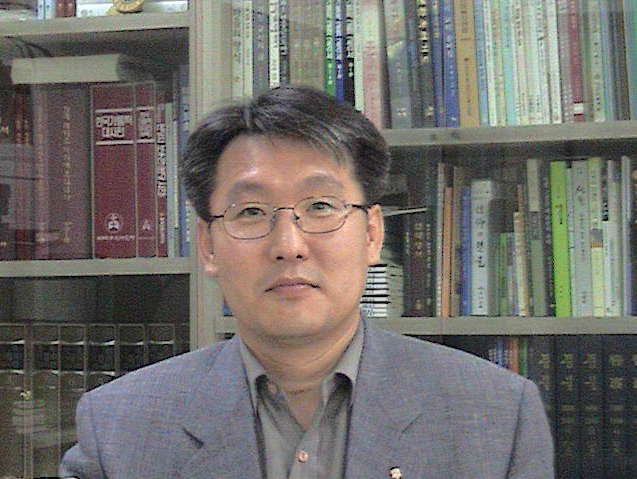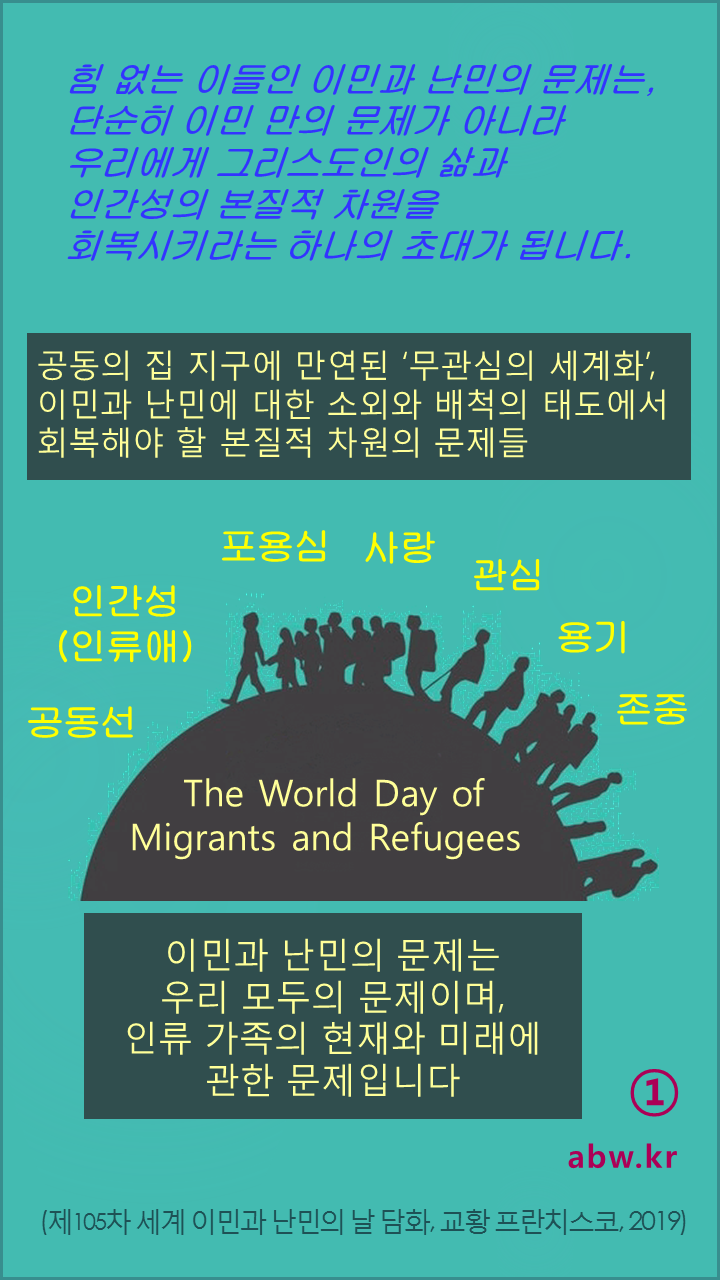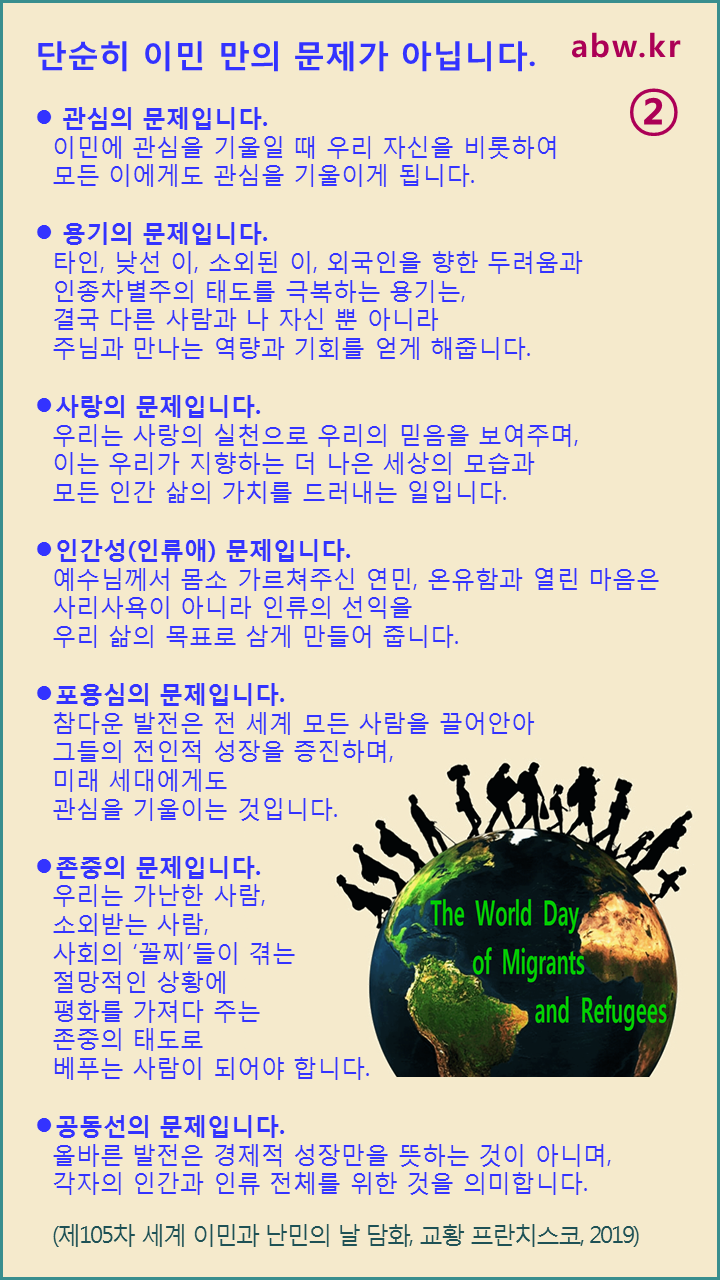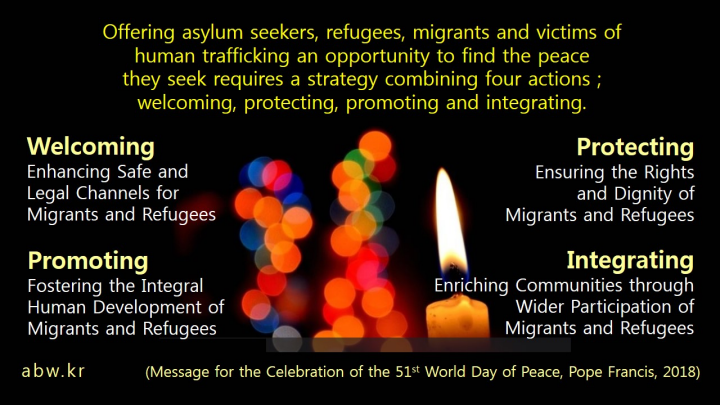교회문헌ㅣ메시지
|
제105차 세계 이민과 난민의 날 교황담화문 | 한글+영어 |
|---|
|
프란치스코 교황 성하의 제105차 세계 이민과 난민의 날 담화 (2019년 9월 29일) MESSAGE OF HIS HOLINESS POPE FRANCIS FOR THE 105th WORLD DAY OF MIGRANTS AND REFUGEES 2019 [29 September 2019] “단지 이민 만의 문제가 아닙니다” “It is not just about migrants” 사랑하는 형제자매 여러분, Dear Brothers and Sisters, 믿음은 우리에게 하느님 나라가 이 지상에 이미 신비로이 현존한다는 확신을 심어 줍니다(사목 헌장 39항 참조). 그러나 오늘날 우리는 애석하게도 여러 걸림돌과 반대 세력이 하느님 나라를 가로막고 있다는 사실을 인정하지 않을 수 없습니다. 무력 분쟁과 전면전이 끊임없이 인류를 분열시키고, 불의와 차별이 속출하고 있습니다. 또한 지역 차원뿐만 아니라 전 세계 차원에서 경제적 사회적 불균형을 극복하기란 여간 어려운 일이 아닙니다. 그런데 특히 가장 가난한 이들과 소외된 이들이 이에 대한 대가를 치르고 있습니다. Faith assures us that in a mysterious way the Kingdom of God is already present here on earth (cf. Gaudium et spes, 39). Yet in our own time, we are saddened to see the obstacles and opposition it encounters. Violent conflicts and all-out wars continue to tear humanity apart; injustices and discrimination follow one upon the other; economic and social imbalances on a local or global scale prove difficult to overcome. And above all it is the poorest of the poor and the most disadvantaged who pay the price. 경제적 선진 사회들에서는 극단적 개인주의를 지향하는 경향이 점점 커지고 있습니다. 이러한 개인주의는 실리적 사고방식과 결부되고 매체를 통해 강화되어 ‘무관심의 세계화’를 조장하고 있습니다. 이러한 상황에서, 이민과 난민, 실향민, 인신매매 피해자들은 배척의 표상이 되어 버렸습니다. 그들은 그들의 여건에 따른 고충 말고도, 흔히 멸시당하거나 사회악의 원인으로 간주되기 때문입니다. 그러한 태도는, 버리는 문화에 굴복할 때에 야기되는 도덕적 타락에 대하여 경종을 울려 줍니다. 실제로 이러한 태도가 지속된다면, 육체적 정신적 사회적 안녕의 합의 기준에 못 미치는 모든 사람은 소외와 배척을 당할 위험에 놓이게 됩니다. The most economically advanced societies are witnessing a growing trend towards extreme individualism which, combined with a utilitarian mentality and reinforced by the media, is producing a “globalization of indifference”. In this scenario, migrants, refugees, displaced persons and victims of trafficking have become emblems of exclusion. In addition to the hardships that their condition entails, they are often looked down upon and considered the source of all society’s ills. That attitude is an alarm bell warning of the moral decline we will face if we continue to give ground to the throw-away culture. In fact, if it continues, anyone who does not fall within the accepted norms of physical, mental and social well-being is at risk of marginalization and exclusion. 이러한 까닭에, 일반적으로 힘없는 이들인 이민과 난민의 존재는 우리에게 하나의 초대가 됩니다. 오늘날 안락하고 풍요로운 삶에 안주해 버릴 위험에 놓여 있는 우리 그리스도인의 삶과 인류의 일부 본질적 차원들을 회복시키라는 것입니다. 따라서 이렇게 말할 수 있습니다. “단지 이민만의 문제가 아닙니다.” 이민에게 관심을 기울일 때, 우리는 우리 자신을 비롯하여 모든 이에게도 관심을 기울이게 됩니다. 이민을 돌볼 때, 우리 모두는 성장하게 됩니다. 이민에게 귀 기울일 때, 우리는 오늘날 잘 눈에 띄지 않아서 계속 숨기고 지나갈 수 있는 우리의 일부에 대해서도 말할 수 있게 됩니다. For this reason, the presence of migrants and refugees – and of vulnerable people in general – is an invitation to recover some of those essential dimensions of our Christian existence and our humanity that risk being overlooked in a prosperous society. That is why it is not just about migrants. When we show concern for them, we also show concern for ourselves, for everyone; in taking care of them, we all grow; in listening to them, we also give voice to a part of ourselves that we may keep hidden because it is not well regarded nowadays. “용기를 내어라. 나다. 두려워하지 마라”(마태 14,27). 이는 이민만의 문제가 아니라, 우리 두려움의 문제이기도 합니다. 우리 시대의 간악하고 추한 모습들은 “‘타인’, 낯선 이, 소외된 이, 외국인을 향한 우리의 두려움을” 점점 키우고 있습니다. “이러한 두려움은 오늘날 보호와 안전과 더 나은 미래를 찾아 우리의 문을 두드리는 이민들과 난민들을 맞닥뜨렸을 때에 특히 두드러집니다. 이러한 만남을 미처 준비하지 못했기 때문에라도, 사실 두려움이 드는 것은 정당한 반응입니다”(‘두려움에서의 자유’에 관한 모임 참석자들을 위한 미사 강론, 사크로파노, 2019.2.15.). 의심과 두려움이 든다는 사실 자체는 문제가 아닙니다. 문제는, 이러한 의심과 두려움이 우리의 생각과 행동 방식에 영향을 주어 결국 우리가 옹졸하고 폐쇄적인 사람이 되고 심지어 자신도 모르는 사이에 인종 차별주의자가 되어 버릴 때입니다. 이처럼 두려움은 나와 다른 사람을 만나고자 하는 바람과 그러한 역량을 우리에게서 빼앗아 갑니다. 두려움은 주님과 만나는 기회를 나에게서 빼앗아 버리는 것입니다(2018년 세계 이민의 날 미사 강론, 2018.1.14. 참조). “Take courage, it is I, do not be afraid!” (Mt 14:27). It is not just about migrants: it is also about our fears. The signs of meanness we see around us heighten “our fear of ‘the other’, the unknown, the marginalized, the foreigner... We see this today in particular, faced with the arrival of migrants and refugees knocking on our door in search of protection, security and a better future. To some extent, the fear is legitimate, also because the preparation for this encounter is lacking” (Homily in Sacrofano, 15 February 2019). But the problem is not that we have doubts and fears. The problem is when they condition our way of thinking and acting to the point of making us intolerant, closed and perhaps even – without realizing it – racist. In this way, fear deprives us of the desire and the ability to encounter the other, the person different from myself; it deprives me of an opportunity to encounter the Lord (cf. Homily at Mass for the World Day of Migrants and Refugees, 14 January 2018). “너희가 자기를 사랑하는 이들만 사랑한다면 무슨 상을 받겠느냐? 그것은 세리들도 하지 않느냐?”(마태 5,46) 이는 이민만의 문제가 아니라, 사랑의 문제입니다. 우리는 사랑의 실천으로 우리의 믿음을 보여 줍니다(야고 2,18 참조). 가장 고결한 사랑은 보답할 수도 없고 감사할 수조차 없는 이들에게 실천하는 사랑입니다. “이는 우리가 그려 나가고픈 사회의 모습과 모든 인간 삶의 가치에 관한 문제이기도 합니다. …… 우리 민족들의 진보는 …… 무엇보다도 우리의 문을 두드리는 이들을 통하여 마음이 움직이고 감화되는 우리의 열린 자세에 달려 있습니다. 그들을 대면할 때, 우리는 우리 삶을 지배하고 속박하는 모든 거짓 우상을 깨트릴 수 있습니다. 이러한 우상들은 다른 이들의 삶과 고통에는 눈감아 버리고 순간적인 헛된 행복을 약속할 따름입니다”(라바트 교구의 카리타스 센터에서 한 연설, 2019.3.30.). “For if you love those who love you, what recompense will you have? Do not the tax collectors do the same?” (Mt 5:46). It is not just about migrants: it is about charity. Through works of charity, we demonstrate our faith (cf. Jas 2:18). And the highest form of charity is that shown to those unable to reciprocate and perhaps even to thank us in return. “It is also about the face we want to give to our society and about the value of each human life... The progress of our peoples... depends above all on our openness to being touched and moved by those who knock at our door. Their faces shatter and debunk all those false idols that can take over and enslave our lives; idols that promise an illusory and momentary happiness blind to the lives and sufferings of others” (Address at the Diocesan Caritas of Rabat, 30 March 2019). “그런데 여행을 하던 어떤 사마리아인은 그가 있는 곳에 이르러 그를 보고서는, 가엾은 마음이 들었다”(루카 10,33). 이는 이민만의 문제가 아니라, 우리 인류의 문제입니다. 유다인들에게는 외국인인 이 사마리아인이 지나쳐 버리지 않은 것은 바로 연민 때문입니다. 연민은 이성만으로 설명할 수 없는 감정입니다. 연민은 우리 인간의 가장 내밀한 심금을 울려, 어려움을 겪는 사람을 보면 그의 ‘이웃이 되어’ 주고자 하는 절실한 충동을 불러일으킵니다. 예수님께서 몸소 가르쳐 주신 대로(마태 9,35-36; 14,13-14; 15,32-37 참조), 가엾은 마음이 든다는 것은 다른 이의 고통을 깨달아 곧바로 그 고통을 어루만져 주고 치유하여 그를 구하려는 행동으로 나아가는 것을 의미합니다. 연민을 가진다는 것은 그러한 온유함을 위한 자리를 마련한다는 의미입니다. 그러나 현대 사회는 흔히 이러한 온유함을 억누르라고 우리에게 요구합니다. “우리가 다른 이들에게 마음을 열 때, 우리는 피폐해지는 것이 아니라 더 풍요로워집니다. 이는 우리가 더 인간다워지는 데에 도움이 되기 때문입니다. 또한 우리 자신이 더 큰 공동체의 능동적인 구성원임을 깨닫고 우리의 삶이 다른 이들을 위한 선물이라는 것을 이해하도록 도와주기 때문입니다. 나아가 이러한 열린 마음은 사리사욕이 아니라 인류의 선익을 목표로 삼게 만들어 줍니다”(바쿠의 ‘헤이다르 알리예프’ 이슬람 사원에서 한 연설, 아제르바이잔, 2016.10.2.). “But a Samaritan traveller who came upon him was moved with compassion at the sight” (Lk 10:33). It is not just about migrants: it is about our humanity. Compassion motivated that Samaritan – for the Jews, a foreigner – not to pass by. Compassion is a feeling that cannot be explained on a purely rational level. Compassion strikes the most sensitive chords of our humanity, releasing a vibrant urge to “be a neighbour” to all those whom we see in difficulty. As Jesus himself teaches us (cf. Mt 9:35-36; 14:13-14; 15:32-37), being compassionate means recognizing the suffering of the other and taking immediate action to soothe, heal and save. To be compassionate means to make room for that tenderness which today’s society so often asks us to repress. “Opening ourselves to others does not lead to impoverishment, but rather enrichment, because it enables us to be more human: to recognize ourselves as participants in a greater collectivity and to understand our life as a gift for others; to see as the goal, not our own interests, but rather the good of humanity” (Address at the Heydar Aliyev Mosque in Baku, 2 October 2016). “너희는 이 작은 이들 가운데 하나라도 업신여기지 않도록 주의하여라. 내가 너희에게 말한다. 하늘에서 그들의 천사들이 하늘에 계신 내 아버지의 얼굴을 늘 보고 있다”(마태 18,10). 이는 이민만의 문제가 아니라, 그 누구도 배척하지 않는 문제입니다. 현대 세계에서는 엘리트 의식이 점점 더 높아지면서 배척받는 이들을 향한 잔인함도 연일 심각해지고 있습니다. 특권을 누리는 극소수 시장들의 이익을 위하여 개발도상국들의 뛰어난 천연 자원과 인적 자원은 지속적으로 고갈되고 있습니다. 전쟁은 세계 일부 지역에만 해당됩니다. 그러나 또 다른 지역들은 전쟁을 일으키는 무기를 제작 판매하면서도, 정작 그러한 분쟁으로 양산된 난민들을 받아들이기 꺼려합니다. 대가를 치르는 사람들은 늘 작은 이들, 가난한 이들, 가장 힘없는 이들입니다. 이들은 식탁에 앉지 못하고, 잔치 식탁의 ‘부스러기’만 차지할 뿐입니다(루카 16,19-21 참조). “‘출발’하는 교회는 …… 두려움 없이 첫걸음을 내딛고 앞으로 나아갈 수 있으며 다른 이들에게 다가가고 멀어진 이들을 찾으며 큰길에 나아가 버림받은 이들을 초대할 수 있습니다”(「복음의 기쁨」, 24항). 배척으로 이루어지는 발전은, 부자는 더욱 부자가 되고 가난한 이는 더욱 가난하게 만듭니다. 반면에, 참다운 발전은 전 세계 모든 사람을 끌어안아 그들의 전인적 성장을 증진하며 미래 세대에게도 관심을 기울이는 것입니다. “See that you do not despise one of these little ones, for I say to you that their angels in heaven always look upon the face of my heavenly Father” (Mt 18:10). It is not just about migrants: it is a question of seeing that no one is excluded. Today’s world is increasingly becoming more elitist and cruel towards the excluded. Developing countries continue to be drained of their best natural and human resources for the benefit of a few privileged markets. Wars only affect some regions of the world, yet weapons of war are produced and sold in other regions which are then unwilling to take in the refugees produced by these conflicts. Those who pay the price are always the little ones, the poor, the most vulnerable, who are prevented from sitting at the table and are left with the “crumbs” of the banquet (cf. Lk 16:19-21). “The Church which ‘goes forth’... can move forward, boldly take the initiative, go out to others, seek those who have fallen away, stand at the crossroads and welcome the outcast” (Evangelii Gaudium, 24). A development that excludes makes the rich richer and the poor poorer. A real development, on the other hand, seeks to include all the world’s men and women, to promote their integral growth, and to show concern for coming generations. “너희 가운데에서 높은 사람이 되려는 이는 너희를 섬기는 사람이 되어야 한다. 또한 너희 가운데에서 첫째가 되려는 이는 모든 이의 종이 되어야 한다”(마르 10,43-44). 이는 이민만의 문제가 아니라, 꼴찌를 첫째 자리에 놓는 문제입니다. 예수 그리스도께서는 우리에게 세상의 논리에 넘어가지 말라고 당부하십니다. 세상의 논리에서는 나 자신의 이득이나 내가 속한 집단의 이득을 위하여 다른 이에게 불의를 저지르는 것이 정당화됩니다. “나 먼저, 그다음에 다른 사람!”이라는 모토 대신에, 그리스도인의 참된 모토는 “꼴찌가 첫째 될 것이다!”입니다. “개인주의적 사고는 이웃에 대한 무관심이 자라는 비옥한 토양이 됩니다. 이는 이웃을 순전히 경제적 측면에서 바라보게 하며 그들에 대한 인간적 관심의 부족, 그리고 결국에는 두려움과 냉소의 감정으로 이어집니다. 이러한 것들이 우리가 종종 가난한 사람, 소외받는 사람, 사회의 ‘꼴찌’들을 향해 보여 주는 태도가 아닌지요? 우리 사회에 이러한 ‘꼴찌’들은 너무나 많습니다! 그들 가운데에서, 저는 우선적으로 이민을 생각합니다. 그들은 고난과 고통의 짐을 짊어지고, 종종 절망적인 상황에서, 평화롭고 존중받는 삶을 살 수 있는 곳을 날마다 찾고 있습니다”(교황청 주재 외교단의 신년 하례회에서 한 연설, 2016.1.11.). 복음의 논리에 따르면, 꼴찌가 첫째 될 것입니다. 또한 우리 자신은 그들을 섬기는 사람이 되어야 합니다. “Whoever wishes to be great among you will be your servant; whoever wishes to be first among you will be the slave of all” (Mk 10:43-44). It is not just about migrants: it is about putting the last in first place. Jesus Christ asks us not to yield to the logic of the world, which justifies injustice to others for my own gain or that of my group. “Me first, and then the others!” Instead, the true motto of the Christian is, “The last shall be first!” “An individualistic spirit is fertile soil for the growth of that kind of indifference towards our neighbours which leads to viewing them in purely economic terms, to a lack of concern for their humanity, and ultimately to feelings of fear and cynicism. Are these not the attitudes we often adopt towards the poor, the marginalized and the ‘least’ of society? And how many of these ‘least’ do we have in our societies! Among them I think primarily of migrants, with their burden of hardship and suffering, as they seek daily, often in desperation, a place to live in peace and dignity” (Address to the Diplomatic Corps, 11 January 2016). In the logic of the Gospel, the last come first, and we must put ourselves at their service. “나는 양들이 생명을 얻고 또 얻어 넘치게 하려고 왔다”(요한 10.10). 이는 이민만의 문제가 아니라, 한 인간 전체에 관한 문제이며 모든 사람에 관한 문제입니다. 예수님의 말씀 안에서, 우리는 예수님 사명의 핵심을 알 수 있습니다. 이는 모든 이가 하느님 아버지의 뜻에 따라 충만한 생명의 선물을 얻도록 하는 것입니다. 우리는 모든 정치 활동과 계획과 사목 활동에서 언제나 사람을 중심에 두어야 합니다. 이를 위해서는, 영적 측면을 포함하여 그 사람의 다양한 모든 측면을 고려하여야 합니다. 그리고 이는 모든 사람에게 적용됩니다. 모든 사람은 근본적으로 평등하다는 것을 인식하여야 합니다. 그러하기에 “발전은 경제적 성장만을 뜻하는 것이 아닙니다. 발전이 올바른 것이 되려면 인간 전체와 인류 전체의 발전이 전체적인 것이라야 합니다”(회칙 「민족들의 발전」, 14항). “I came so that they might have life and have it more abundantly” (Jn 10:10). It is not just about migrants: it is about the whole person, about all people. In Jesus’ words, we encounter the very heart of his mission: to see that all receive the gift of life in its fullness, according to the will of the Father. In every political activity, in every programme, in every pastoral action we must always put the person at the centre, in his or her many aspects, including the spiritual dimension. And this applies to all people, whose fundamental equality must be recognized. Consequently, “development cannot be restricted to economic growth alone. To be authentic, it must be well-rounded; it must foster the development of each man and of the whole man” (SAINT PAUL VI, Populorum Progressio, 14). “그러므로 여러분은 이제 더 이상 외국인도 아니고 이방인도 아닙니다. 성도들과 함께 한 시민이며 하느님의 한 가족입니다”(에페 2,19). 이는 이민만의 문제가 아니라, 하느님과 인간의 도성을 건설하는 문제입니다. 이민의 시대라고도 일컬을 수 있는 오늘날, 많은 순진한 사람들이 기술과 소비주의의 발전에는 한계가 없다고 생각하는 ‘엄청난 기만’의 피해자가 되고 맙니다(「찬미받으소서」, 34항 참조). 그 결과, 그들은 좌절될 수밖에 없는 기대를 품고 ‘낙원’을 향한 여정을 시작합니다. 그들의 존재는 때때로 불편하게 느껴질 수도 있지만, 다수의 착취 위에서 소수만이 혜택을 누리는 발전 신화의 실상을 폭로하는 데에 이바지합니다. “우리는 이민과 난민에게서, 우리가 해결해야 하는 문제만을 보는 것이 아니라, 환대하고 존중하고 사랑해야 하는 형제자매를 알아보아야 하고, 다른 이들도 그렇게 할 수 있게 도와야 합니다. 인민과 난민은 우리가 더욱 정의로운 사회, 더욱 완벽한 민주주의, 더욱 단결된 나라, 더욱 형제적인 세상, 그리고 복음에 따라 더욱 열린 그리스도인 공동체를 만들어 가는 데에 이바지하도록 하느님께서 우리에게 마련해 주신 기회입니다”(2014년 세계 이민의 날 담화). “So then you are no longer strangers and sojourners, but you are fellow citizens with the holy ones and members of the household of God” (Eph 2:19). It is not just about migrants: it is about building the city of God and man. In our time, which can also be called the era of migration, many innocent people fall victim to the “great deception” of limitless technological and consumerist development (cf. Laudato Si’, 34). As a result, they undertake a journey towards a “paradise” that inevitably betrays their expectations. Their presence, at times uncomfortable, helps to debunk the myth of a progress that benefits a few while built on the exploitation of many. “We ourselves need to see, and then to enable others to see, that migrants and refugees do not only represent a problem to be solved, but are brothers and sisters to be welcomed, respected and loved. They are an occasion that Providence gives us to help build a more just society, a more perfect democracy, a more united country, a more fraternal world and a more open and evangelical Christian community” (Message for the 2014 World Day of Migrants and Refugees). 사랑하는 형제자매 여러분, 현재 이민이 제기하는 도전들에 대한 우리의 응답은 다음의 네 동사로 요약할 수 있습니다. 곧 ‘환대하기, 보호하기, 증진하기, 통합하기’입니다. 그러나 이는 이민과 난민에게만 해당되는 것이 아니라, 생존의 벼랑 끝에서 살아가고 있는 모든 이에 대한 교회의 사명을 표현하고 있습니다. 이들에게는 환대와 보호와 증진과 통합이 필요합니다. 우리가 이 네 가지를 실천한다면, 하느님과 인간의 도성을 건설하는 데에 이바지하고, 모든 사람의 온전한 인간 발전을 증진하게 될 것입니다. 또한 우리는 세계 공동체가 세운 지속 가능한 발전의 목표에 더욱 가까이 다가가는 데에 도움이 될 것입니다. 환대와 보호와 증진과 통합을 위한 노력 없이는 이 목표를 달성하기 어려울 것입니다. Dear brothers and sisters, our response to the challenges posed by contemporary migration can be summed up in four verbs: welcome, protect, promote and integrate. Yet these verbs do not apply only to migrants and refugees. They describe the Church’s mission to all those living in the existential peripheries, who need to be welcomed, protected, promoted and integrated. If we put those four verbs into practice, we will help build the city of God and man. We will promote the integral human development of all people. We will also help the world community to come closer to the goals of sustainable development that it has set for itself and that, lacking such an approach, will prove difficult to achieve. 한마디로, 이민 문제만이 위기에 빠져있는 것이 아닙니다. 이는 이민만의 문제가 아니라 우리 모두의 문제이며 인류 가족의 현재와 미래에 관한 문제입니다. 그리고 이민, 특히 가장 힘없는 이들은 우리가 ‘시대의 징표’를 읽을 수 있도록 도와줍니다. 그들을 통하여, 주님께서는 우리를 회개로 부르십니다. 우리가 배척, 무관심, 버리는 문화에서 벗어나라고 부르십니다. 그들을 통하여, 주님께서는 다시 한번 우리가 그리스도인의 삶을 온전히 실천하고, 각자의 고유한 소명에 따라 하느님의 계획에 더욱더 맞갖은 세상을 건설하는 데에 기여하라고 초대하십니다. (Fr. 하느님 나라의 완성을 향한 여정에서 그 분의 계획에 협력하라고 초대하신다) In a word, it is not only the cause of migrants that is at stake; it is not just about them, but about all of us, and about the present and future of the human family. Migrants, especially those who are most vulnerable, help us to read the “signs of the times”. Through them, the Lord is calling us to conversion, to be set free from exclusivity, indifference and the throw-away culture. Through them, the Lord invites us to embrace fully our Christian life and to contribute, each according to his or her proper vocation, to the building up of a world that is more and more in accord with God’s plan. 이러한 희망이 담긴 기도 안에서, 여정의 성모님이신 동정 마리아의 전구를 통해서, 하느님의 풍성한 축복이 세상의 모든 이민과 난민 그리고 그들의 여정을 동반하는 모든 이에게 가득하기를 간구합니다. In expressing this prayerful hope, and through the intercession of the Virgin Mary, Our Lady of the Way, I invoke God’s abundant blessings upon all the world’s migrants and refugees and upon all those who accompany them on their journey. 바티칸에서 2019년 5월 27일 프란치스코 From the Vatican, 30 April 2019 FRANCIS * 프란치스코 교황께서는 2019년부터 ‘세계 이민의 날’을 9월 마지막 주일로 이동한다고 발표하셨다(제104차 세계 이민의 날, 2018.1.14.). 보편 교회에 맞추어 한국 교회도 주교회의 2019년 춘계 정기총회 결정에 따라 9월 마지막 주일에 ‘세계 이민의 날’을 지내기로 하였다. <원문: Message of His Holiness Pope Francis for the 105th World Day of Migrants and Refugees 2019, “It is not just about migrants”, 2019.5.27., 영어와 이탈리아어>
한글+영어 원문 : 서울대교구 정평위 한글 원문 : 한국천주교주교회의 http://www.cbck.or.kr/Notice/20190004 영어 원문 :
사회교리콘텐츠 : 천주교 더나은세상
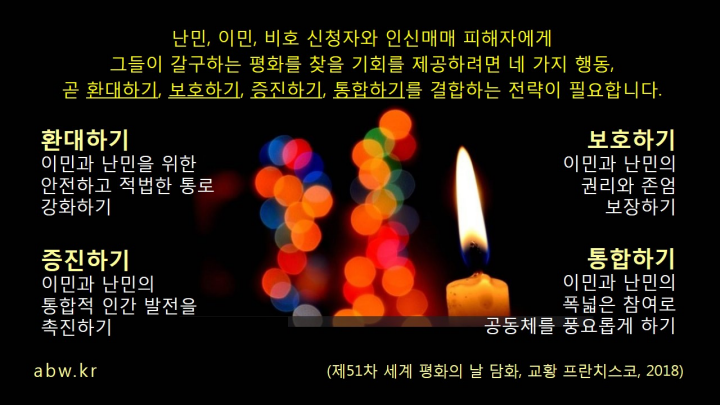
0 2,303 0 |




 게시판 운영원칙
게시판 운영원칙 Help Desk
Help Desk
